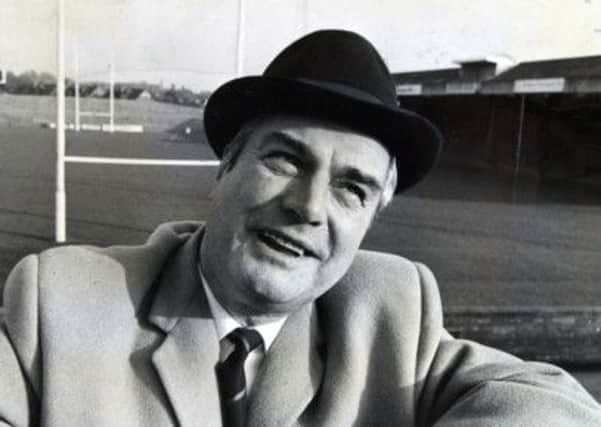Up and under the public persona of rugby league legend


IT’S not often you think of Lou Reed and Eddie Waring at the same time, but the following line in one of the late rock star’s obituaries prompted me to make this unlikely connection. “Lou Reed, Lou told me,” wrote an obituarist, “was a persona he used to keep people at a distance”.
It made me think about Eddie, a working-class lad from Dewsbury who rose to become one of the most famous, and impersonated, men in Britain. Sadly, a younger generation might not have heard of him, but to my age group – born in the 1960s – he was a national institution. Equally sadly, a small minority of Yorkshiremen thought he should be in one.
Advertisement
Hide AdAdvertisement
Hide AdIn the late 1970s, a 12,000-name petition was organised asking for the “Talking Trilby” to be axed by the BBC. His crime was that he had turned rugby league commentary into “a music-hall comedy”. In short, he had sold out the People’s Game – and sold his soul to the devil.
Pretty strong stuff, but Eddie aroused strong passions. Or at least his public persona did.
Dyed-in-the-wool northern fundamentalists, who believed that rugby league was a cultural expression of the true England – ie, the industrial North – insisted his so-called “gormless Yorkshireman act” and bizarre accent, especially when reimagined by Mike Yarwood, the Monty Python team and other impressionists, set the game back years.
The truth was he was something of a pioneer, helping to drive through the changes that propelled it into the national consciousness. And he was a sharp operator: a canny, deal-making entrepreneur who virtually ran the sport from his base at the Queens Hotel in Leeds.
Advertisement
Hide AdAdvertisement
Hide AdThis role-playing – the difference between the real Eddie Waring and his public persona – is the narrative that drives a dark comedy I have written for the West Yorkshire Playhouse called Playing The Joker. In the play, Eddie says: “To your lot, rugby league is just bingo, beer and rolling around the mud. To us, it’s a defining identity, a passion, a way of life, part of the life-blood of northerners. It’s our cultural adrenalin.”
Arguably, without his vision there would have been no Super League, nor indeed the global jamboree that this very entertaining World Cup is turning out to be.
Comparing him to Lou Reed was the kind of thing the Oxbridge-educated Pythons would have loved to do. They were always getting a comedy Eddie Waring character to commentate on opera or discuss art – with “hilarious” consequences. Indeed, the very idea that there could be a serious (although funny) play about Eddie, or that rugby league could have any connection to culture, would have been mocked to high heaven. And yet, this month, there have been many cultural activities connected to the World Cup.
I have visited a superb exhibition of ceramic sculpture at Leeds Town Hall called On The Edge which, according to the artist Mandy Long, was inspired by watching Leeds Rhinos.
Advertisement
Hide AdAdvertisement
Hide AdI went to an inspiring civic reception welcoming the New Zealand and Italy teams which featured, amongst many brilliant acts, the phenomenal Leeds Young Authors. And, as part of the Leeds Film Festival, the classic film This Sporting Life is being shown.
When this movie was shown half-a-century ago it was hailed as an instant classic. Starring Richard Harris, it was based on a famous novel by Wakefield writer David Storey. Storey knew all about the conflict between two personas: in the 1950s he played professionally for Leeds Rugby League – whilst attending the Slade School of Art in London.
Storey once said: “I mourn the transformation of rugby league from a community- based sport to another branch of the entertainment industry.”
What this World Cup is showing, I think, is that it can be both. There is a great deal of entertainment to be had, both on and off the pitch.
Advertisement
Hide AdAdvertisement
Hide AdAlthough he is so something of a forgotten figure these days, this metamorphosis wouldn’t have taken place without Eddie’s pioneering actitvities.
As he says in the play: “I want this game to have glamour, prestige, exposure and power. I want it to have a bright and glittering future. I want razzmatazz, fireworks, booming pop songs and dancing girls.” And, he might have added, plays that examine Yorkshireness, revenge, revolution – and why trilby hats went out of fashion.
Playing the Joker, West Yorkshire Playhouse, November 19 to 23. 0113 213 7700, www.wyp.org.uk